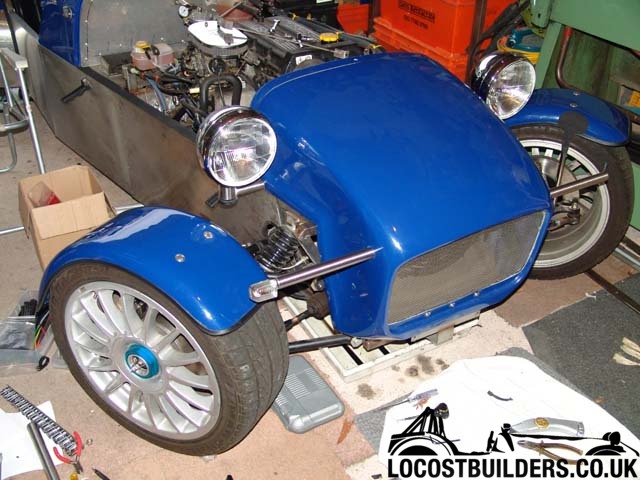
Exempt frontal area
JohnN - 23/6/06 at 06:52 PM
I'm having to refit my front indicators ready for sva next Friday, as they were too far from the edge of the car (back wider than front by
4" per side) just realised this in time!
In doing so they are on 9" long stalks that have to be high and at the front of the nosecone to miss the wheels on full lock.
It's just occured to me that in their present position they will form the bottom of the car when tested with the 30 degree cone etc.
Does this mean that the wishbones, track rods et are all exempt from measure, as they are all behind and below this definition of the base of the
car?
Anybody got any SVA experience of this?
JohnN
BKLOCO - 23/6/06 at 07:09 PM
Yep! Thats exactly what happened to me at Chelmsford Essex SVA centre.
All the suspension was classed as exempt as the stalks raised the effective floor line.
I have heard of people failing though because the tester said that the stalks were not "structural" I think this was the examiner
"interpreting" the rules to suit himself though.
smart51 - 23/6/06 at 07:33 PM
My SVA tester expressed surprised that I've mounted mine so low for exactly this reason. I've covered up all the sharp edges though.
whitestu - 23/6/06 at 07:41 PM
Can you explain how this would make the suspension etc. exempt?
Thanks
Stu
JohnN - 23/6/06 at 07:56 PM
There's a definition of what the bottom of the car is in the SVA regs, everything below the base is exempt from the contactable surface rules.
The definition is to push a tall 30 degree (to the vertical) cone up against the external perimeter of the car, where it touches is then defined as
the base
I've just bonded in a one piece tube, passing through the nosecone at the very top, front corners, ref structural - mine will be very stiff - no
flex at all.
The best of all is that my bike indicators from Vehicle Wiring Products, slip inside the tube (and will be held in with a grub screw at the back)
wiring passing through the tube and out of some holes I made, inside the nosecone.
See attached pic
[img]http:// [/img]
[/img]
[Edited on 23/6/06 by JohnN]
scoop - 23/6/06 at 08:12 PM
This is why Dax do the indicators with a rigidly fixed steel tube. Theirs is ugly, yours looks better John
the_fbi - 23/6/06 at 09:07 PM
quote:
Originally posted by JohnN
The definition is to push a tall 30 degree (to the vertical) cone up against the external perimeter of the car, where it touches is then defined as
the base
Can you bodge a diagram onto your picture to describe this?
JohnN - 23/6/06 at 09:35 PM
Bodge a diagram!
Here's the page from the SVA manual
[img]http:// [/img]
[/img]
BKLOCO - 24/6/06 at 06:38 AM
In case you're still having trouble as the description in the manual is somewhat missleading IMHO.
If you look at Diag 1.
Anything BELOW the point where the cone touches the body work DOES NOT have to comply with the radius requirements. ie. The bumper in this diagram.
Therefore. If the point that cone FIRST touches the car is the indicator bar, and that said indicator bar is ABOVE and AHEAD of the suspension
components then they are ALL EXEMPT.
whitestu - 24/6/06 at 07:40 AM
Looking at JohnN's pic of his car, wouldn't the nose cone be the first thing the sphere hit, not the indicators?
Stu
the_fbi - 24/6/06 at 09:06 AM
quote:
Originally posted by whitestu
Looking at JohnN's pic of his car, wouldn't the nose cone be the first thing the sphere hit, not the indicators?
Stu
Key part of the text above Fig 2.
Where an item (other than the body) is contactable by the cone such that the floor line is determined by that item (ie in this example the rear
fog lamp), the floor line will be taken to be that applicable had the component not been fitted; However over the width of the component the floor
line will become the lower edge of the component. (See Fig.2)
[Edited on 24/6/06 by the_fbi]
whitestu - 24/6/06 at 09:29 AM
Thanks
I understand now!


 [/img]
[/img] 
 [/img]
[/img]